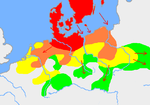The preterite or preterit (/ˈprɛtərɪt/ PRET-ər-it; abbreviated PRET or PRT) is a grammatical tense or verb form serving to denote events that took place...
24 KB (2,447 words) - 23:04, 6 April 2024
Germanic verbs (redirect from Preterite-present verb)
tenses: present (also conveying future meaning) and past (sometimes called "preterite" and conveying the meaning of all of the following English forms: "I did...
29 KB (2,932 words) - 13:50, 18 June 2024
lack of a preterite (see its etymology below) means that it neither passes nor fails one of the criteria Even for lexical verbs, preterite forms have...
82 KB (9,946 words) - 14:17, 30 June 2024
preterite: gaf; English: infinitive: (to) give, preterite: gave; German: infinitive: geben, preterite: gab; Icelandic: infinitive: gefa, preterite: gaf;...
91 KB (10,145 words) - 13:45, 1 September 2024
Aspect: perfective or imperfective (distinguished only in the past tense as preterite and imperfect) Voice: active or passive The modern Spanish verb paradigm...
79 KB (10,121 words) - 12:14, 19 September 2024
Go (verb) (section Development of a new preterite)
verb except be, the preterite (simple past tense) of go is not etymologically related to its infinitive. Instead, the preterite of go, went, descends...
11 KB (1,278 words) - 16:19, 20 March 2024
All e-verbs (with -de in preterite) and j-verbs get the following inflections: All other e-verbs (those with -te in preterite) get the following inflections:...
67 KB (6,452 words) - 16:36, 28 May 2024
Proto-Celtic language (section Preterite formations)
or three major preterite formations in Proto-Celtic, plus another moribund type. The s-preterite The reduplicated suffixless preterite (originating from...
84 KB (5,144 words) - 20:08, 11 September 2024
English has two primary tenses, past (preterite) and non-past. The preterite is inflected by using the preterite form of the verb, which for the regular...
228 KB (23,164 words) - 05:21, 17 September 2024
Komi grammar (section Preterite I)
tenses in Komi which use a preterite form of the main verb and a preterite form of the auxiliary verb 'to be'. The Komi preterite III makes use of the main...
25 KB (1,479 words) - 05:07, 23 January 2024




